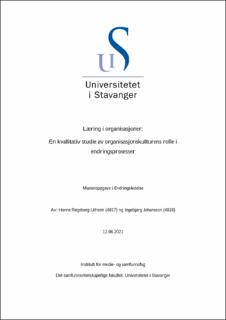| dc.contributor.advisor | Fisker, Jens Kaae | |
| dc.contributor.author | Johansson, Ingebjørg | |
| dc.contributor.author | Utheim, Hanne Røgeberg | |
| dc.date.accessioned | 2021-09-08T16:26:18Z | |
| dc.date.available | 2021-09-08T16:26:18Z | |
| dc.date.issued | 2021 | |
| dc.identifier | no.uis:inspera:83538997:1902886 | |
| dc.identifier.uri | https://hdl.handle.net/11250/2774701 | |
| dc.description.abstract | Formålet med denne undersøkelsen er å bidra med kunnskap angående praksisfellesskaper,
organisasjonskultur og endringsvilje i tilknytning til endringsprosesser og sosial læring. Dette
danner utgangspunktet for problemstillingen som vil belyse organisasjonskulturens rolle i
endringsprosesser. Det teoretiske rammeverket, Etienne Wengers sosiale læringsteori, er valgt
som utgangspunkt da teorien fremsto som en god måte å analysere våre funn og resultater på
gjennom drøfting og vurdering av resultatenes utgangspunkt for å skape felles læring i
organisasjonen. Selskapet som danner rammeverket for denne undersøkelsen, har gjennomgått
flere endringsprosesser som har fått varierende utfall og vår undersøkelse søker å analysere
hvordan læring kan fordres i endringsprosesser i lys av komponentene tilknyttet Wengers
teori.
Denne undersøkelsen har et kvalitativt intervjudesign myntet på semi-strukturerte intervjuer.
Vi intervjuet seks av Selskapets ledere og ansatte for å få et tosidig perspektiv på
organisasjonskulturen. Som analyse har vi benyttet abduktiv analyse med grunnprinsippene
og retningslinjene til Grounded Theory som presentert av Charmaz (2015, s. 53-84). Som et
resultat av analysen fant vi åtte konsepter gjennom primær- og fokusert koding. Disse ble
grunnlaget for fire kategorier, og disse fire kategoriene benyttes for å besvare våre tre
forskningsspørsmål og overordnede problemstilling.
Av resultatene trekkes det frem at de ansatte er deltakende i enkelte endringsprosesser, de
med bottom-up tilnærming, mens ansattes deltakelse som regel er redusert i top-down styrte
endringsprosesser. Videre ble det klart at Selskapet mangler praksiser i tilknytning til
evaluering og kunnskapsdeling. Til slutt viste resultatene at det er et opplevd identitetsskille
mellom ansatte i Selskapet og eierbedriften. Gjennom drøfting av resultatene i lys av Wengers
teori fant vi at Selskapets bruk av kommunikasjon og organisasjonsstrukturer blant annet kan
tilrettelegge for utvikling av nye læringsprosesser i Selskapet som et praksisfellesskap,
resonnement og ledelse kan bidra til nye praksiser knyttet til evaluering og kunnskapsdeling
mens inkludering og organisasjonskultur kan bidra til å belyse hvordan læring fordres
gjennom deltakelse og identitetsendring. I lys av disse faktorene dannes et godt grunnlag for å
identifisere organisasjonskulturens rolle i endringsprosesser. | |
| dc.description.abstract | The aim of this thesis is to contribute with knowledge within the field of Communities of Practice, organizational culture and the readiness to change in relation to change processes and social learning. This is the base for our problem statement which purpose is to shed light on the role of the organizational culture in change processes. The theoretical framework, Etienne Wenger’s Social Learning Theory, has been chosen due to the fact that we believed it to be a good way to analyze our results through discussion and assessment of the results’ starting point to create joint learning in an organization. The company, hereafter Company, that forms the framework for this study has undergone several change processes with varying outcomes, and our study seeks to analyze how learning can be required in change processes in the light of the four components Wenger’s theory presents.
This thesis has a qualitative interview design using semi-structured interviews for data gathering. We interviewed six of the Company's managers and employees to gain a two-way perspective on the organizational culture. As an analysis, we have used abductive analysis with the basic principles and guidelines of Grounded Theory as presented by Charmaz (2015, p. 53-84). The analysis resulted in eight concepts through primary and focused coding. These became the basis for four categories, and these four categories are used to answer our three research questions and problem statement.
The results show that employees are participating in certain change processes, those with a bottom-up approach, while employee participation is usually reduced in top-down controlled change processes. Furthermore, it became clear that the Company lacks practices within formal evaluation and knowledge sharing. Finally, the results showed that there is a perceived identity difference between employees in the Company and the owner company. Through discussion of the results in light of Wenger's theory, we found that the Company's use of communication and organizational structures can facilitate the development of new learning processes in the Company as a community of practice, reasoning and management can contribute to new practices related to evaluation and knowledge sharing while inclusion and organizational culture can shed light on how learning is required through participation and identity change. In light of these factors, a good basis is formed for identifying the role of organizational culture in change processes. | |
| dc.language | nob | |
| dc.publisher | uis | |
| dc.title | Læring i organisasjoner: En kvalitativ studie av organisasjonskulturens rolle i endringsprosesser | |
| dc.type | Master thesis | |
